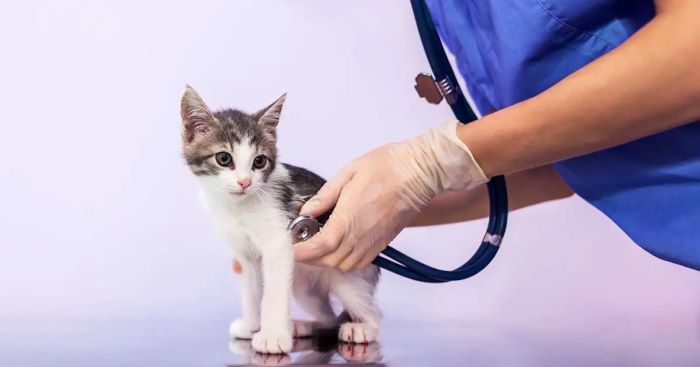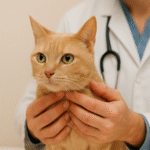For the best possible start, take your new cat to a vet as soon as you can for a comprehensive check-up. This first visit is the time to have the protective vaccinations that will help to keep your pet safe from most serious feline infections.
You can also speak to the vet about neutering and microchipping. Follow up the visit with annual health checks throughout your cat’s life.
Before bringing a new cat home, look for a veterinary practice that is local to you. The breeder of your cat may be able to recommend one. Alternatively, consult friends, look at local newspaper and internet advertisements, or ask a local shelter or one of the cat breed organizations for suggestions.
Visiting local practices to find out how they are organized can be useful; check to see if they have arrangements that reduce stress for nervous pets, such as separate access and waiting areas for cats and dogs, and raised areas to place cat baskets.
The First Visit
If you buy a pedigree kitten, he should have had his first vaccinations before you take him home at about 12 weeks. The breeder will give you the vaccination certificate, which you should show the vet on your initial visit.
An early health check at the vet is still important. A cat adopted from a rescue shelter should ideally have had a vet examination. If not, arrange for him to have a full check-up as soon as you take ownership. Going to the vet is stressful for most cats, because they encounter strange people and animals.
Take your cat in a carrier, and keep its door facing you in the waiting room so that he can see you and be reassured. At this first appointment the vet will assess your cat’s general health by giving him a thorough all-over examination. If your kitten has not been vaccinated and is more than nine weeks old, he will be given his first vaccinations now.
Be ready with a list of questions, since the vet will be able to answer any questions on general cat care and offer advice on the control of common parasites such as worms, fleas, and mites. Now is also the right time to ask the vet about microchipping and neutering, if these procedures have not already been performed.
Having your cat microchipped means that he can be easily identified if he strays or is involved in an accident.
Neutering

Vets usually recommend that kittens be neutered at around four months of age, before they reach sexual maturity. Neutering is a procedure performed under general anesthesic to remove the ovaries and uterus in females and the testicles in males. Aside from preventing unwanted litters, having your cat neutered has other benefits.
Unneutered males, or toms, often roam far from home and have the habit of spraying urine around their territory, even in the house, as a calling card to receptive females. These roving toms can be very aggressive.
Unneutered females, or queens, are at risk of frequent pregnancies that can sap their general health, and when in heat they become agitated, calling constantly to attract males, which is stressful for cats and owners alike.
After neutering, these sexual behaviors either disappear or never develop in the first place. Neutering also reduces the chances of sexually transmitted infections being passed between cats, and it removes the risk of cancer of the reproductive organs.
After neutering, your kitten will stay at the vet for only a few hours and will usually recover within a few days. A female kitten may have a few stitches in the skin, or none at all.
The vet will tell you whether the stitches are dissolvable—in which case they should gradually disappear—or whether they need to be removed, usually about 10 days after the operation.
Vaccinations
By having your cat immunized against infectious diseases that may be caught from the environment or from other cats, you can improve his chances of a long and healthy life. Vaccines work by stimulating the immune system so that it is ready to put up a defense if exposed to an infection.
All cats should be immunized against feline panleukopenia virus (FPV), feline calicivirus (FCV), and feline herpes virus (FHV). Cats at high risk for feline leukemia virus (FeLV), Chlamydophila felis, and rabies may also need immunization. Kittens have their first routine injections from around nine weeks old (12 weeks for rabies) and should have a full booster vaccination 12 months later (except for rabies).
FPV, caused by feline parvovirus, is also called feline infectious enteritis or feline distemper. It easily spreads between cats and attacks the white blood cells, weakening the immune system. If kittens are infected just before or after birth they may die or suffer brain damage.
FCV and FHV cause up to 90 percent of upper respiratory infections, or “cat flu.” Even when they have recovered from the flu, cats may still carry the virus and pass it to others. Vaccination will not prevent the diseases, but it can make them less severe. The potentially deadly feline leukemia virus (FeLV) is shed in saliva, other body fluids, and feces.
Pregnant or nursing cats can pass it to their kittens. Some cats may overcome the virus, but it can take hold in kittens or in cats that are already sick. The virus attacks the immune system, destroying white blood cells, and may cause blood cancers such as lymphoma or leukemia
It may also destroy developing red blood cells, causing anemia. The bacterium Chlamydophila felis mainly causes conjunctivitis, with sore, inflamed inner eyelids and excess tears. It can also cause mild cat flu. Vets may advise vaccination for cats living in groups. Rabies is a highly dangerous viral infection that can also be passed to humans.
It is a global problem; only a few countries, such as the UK, are unaffected. The virus is transmitted in saliva, usually by a bite from an infected animal. Immunization against rabies is very effective. One of the most lethal viruses to infect cats is feline infectious peritonitis (FIP).
This usually fatal disease is an uncommon mutation of feline coronavirus, an infection that may cause only mild gastroenteritis, or no signs of illness at all. Protection is difficult to provide, as immunization against FIP can be given only to kittens over 16 weeks old, by which time many will already have been exposed to coronavirus infection. FIP is most likely to occur within breeding groups and among very young or old cats.
Follow-Up Visits
Most cats and kittens come through their initial check-up with a clean bill of health, but health issues inevitably arise over the years. Rather than waiting until things go wrong, book your pet an annual veterinary visit for booster vaccinations and a check-up so that potential problems can be identified and dealt with early on.





